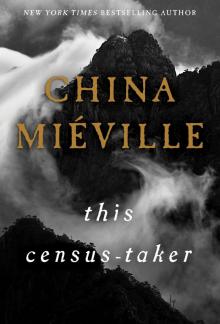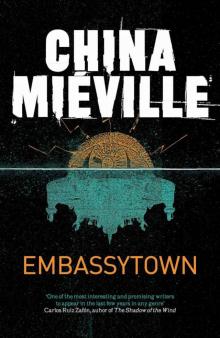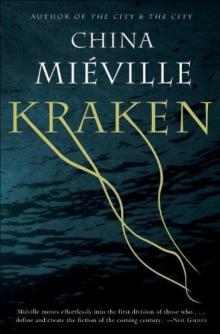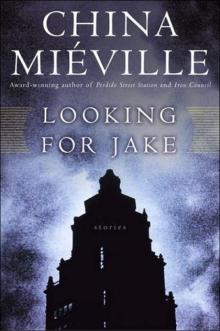- Home
- China Miéville
The Scar Page 23
The Scar Read online
Page 23
“Remember the razor golems?” said the Brucolac suddenly, and Uther Doul fell silent. “The steamwind plain?” the Brucolac continued. “Remember that place? The things we saw? This city owes us, Uther. We were the ones who saved it, whether they’ll admit it, whether they know it or not. Where were the damn Lovers then? That was you . . . and me.”
The call of gulls. The sound of wind between the boats, the creaking of the haunted quarter.
“I learnt things then, Uther.” The Brucolac spoke quietly. “I learnt how to read you. I know you.”
“Godsdammit!” Uther Doul faced him. “How dare you play old soldiers with me? I am not on your side, Brucolac! I do not agree with you! Can you understand that? We have history, it’s true, and Khyriad knows I’ll not willingly turn on you, Deadman, but . . . that is all. I’m a lieutenant, and you were never my captain. I came here tonight as you asked, out of courtesy to you. Nothing more.”
The Brucolac held his hand to his mouth and eyed Doul. His long tongue flickered over his fingers. When he lowered his hand, he looked sad.
“The Scar does not exist,” he said. There was silence.
“The Scar does not exist,” he repeated, “and if by some chance the astrolonomers are wrong, and it does, then we’ll not find it. And if by some fucking miracle we do find it, then you know—you, Uther, of all people know—that it’ll mean our deaths.”
He pointed briefly at the sword scabbarded on Doul’s left side. He moved his finger, indicating his companion’s right sleeve, ridged with branching wires like veins.
“You know that, Uther,” the Brucolac said. “You know the forces that would spill from something like that. You know we couldn’t possibly face them. You know that better than anyone, whatever those fools think they’ve learnt from you. It would mean the end of us all.”
Uther Doul looked down at his sword.
“Not our deaths,” he said, and smiled unexpectedly and beautifully. “Nothing so straightforward.”
The Brucolac shook his head.
“You’re the bravest man I’ve known, Doul, in more ways than I can count.” His tone was wistful, regretful. “Which is why it bewilders me to face this side of you. This base, pusillanimous, cowardly, recreant, craven aspect.” Doul did not move or react, and the Brucolac did not sound as if he was taunting. “Have you convinced yourself that the bravest thing is to do your duty, come what may, Uther?”
He shook his head, his gaze incredulous. “Are you a masochist, Uther Doul? Is that it? Does it make you hard to debase yourself like this? Do you find yourself erect when those cut-up cunts give you orders you know to be idiocy? Do you come, do you touch yourself when you obey them regardless? Well good godspit, your cock must be raw from tugging by now, because these are the most lunatic orders you have ever tried to obey, and you know that.
“And I will not allow you to carry them out.”
Doul watched, motionless, as the Brucolac turned his back and strode away.
The vampir wrapped shadow around himself as he walked, vanishing quickly into a fog of glamour, his footsteps muting as he disappeared. There was a rustling sound in the air, and way above the deck the old rigging thrummed briefly as something brushed it and was gone.
Doul followed the noises up through the air with his eyes. Only when everything around him was still did he turn back to the sea and the haunted quarter, his hand resting on the pommel of his sword.
Chapter Sixteen
With atlases and explorers’ monographs, Bellis and Silas drew maps of Gnurr Kett and the Cymek and Iron Bay. They tried to trace a route home.
The anophelii island was unmarked, but interpreting the stories of the cactacae merchants, they worked it out to be some scores of miles from the southern tip of Gnurr Kett, a thousand miles or so from the island’s civilized northern shores. And from that northern edge it was almost another two thousand to New Crobuzon.
Bellis knew how uncommon it was to see Kettai ships at harbor in the city’s Kelltree docks. She foraged in works of political economy and traced the routes of commodities from Dreer Samher to Gnurr Kett, to Shankell, to the Mandrake Islands and Perrick Nigh and Myrshock, and eventually, perhaps, by some tortuous route or other, to New Crobuzon.
“From the mosquito island we’ll be almost as far from the city as if we’d made it to the damn colonies,” said Bellis bitterly. “Thousands of miles of unknown waters and mapless places and rumors and crap in between. Right at the wrong end of a long, long trading chain.”
All their free moments were spent like this, hunched together in Bellis’ cylindrical room, ignoring the sounds and the daylight or lamplight outside, she smoking furiously, cursing at Armada’s unpleasant ship-grown tobacco, both of them scribbling note after note, hunting through old books. Trying to make something from the knowledge they’d stolen. Trying to work out an escape.
They had hunted hard for the city’s secret. Now that they had it, the slowly dawning understanding that still, even so, even with that knowledge they might not make it home, appalled them.
If we can just work out where we’ll be . . . Bellis would think, and a queasy understanding would grow in her that it was not as if the whole damn city would dock, or would trundle past Kohnid or some other port in plain view. And if it did, she would still have to fight her own way from the city to the shore, to the docks, to a ship, across the water again, home. And there was no way at all that she could make that happen.
Get me to the shore, she thought. If I could get to the shore, maybe I could persuade someone to help me, or I could steal a boat, or I could stow away, or . . . something . . .
But she could not get to the shore. And even if she could, all those ideas might come to nothing, and she knew it.
“Shekel came to see me today,” she said. “It’s been near enough a week since he gave me the book, Silas. He asked me what it was, whether it was what Tintinnabulum was looking for. I told him I’d know for certain soon.”
“It won’t be long,” she said ominously. “It won’t be long till he overcomes his shyness and tells someone. He’s friends with some loyal dockhand who works for the Lovers. He’s fucking Tintinnabulum’s servant, for Jabber’s sake.
“We have to move, Silas. We have to make a decision. We have to decide what we’re going to do. When he tells his friends that he found the book by Krüach Aum, the yeomanry’ll be here in minutes. And then not only will they have the book, but they’ll know we were keeping it from them. And gods know I don’t want to see the inside of an Armadan jail.”
It was impossible to judge how much exactly the Lovers knew about raising the avanc. They must know something—the location of the sinkholes, the scale of the engines and thaumaturgy necessary, perhaps some parts of the science required. But they were particularly seeking the volume by Krüach Aum.
The only description of a successful attempt to call and capture an avanc, Bellis thought. They know whereabouts in the world to go, but I’m betting there’s a load they don’t know. They must think they can piece it together, and probably they can, in time. But I just bet this would make things a damn sight easier.
And she wrestled with stupid ideas, like demanding her freedom in exchange for the book, knowing miserably that that would never work. Hope was slipping away from her, and that made her cold.
In a kind of desperate carelessness, she talked with Carrianne about escape. Couching all her questions and ideas in an idiotically unconvincing what if? register, she asked Carrianne whether she had ever wanted to leave the city.
Carrianne grinned with friendly cruelty. “Never crossed my mind,” she said.
They were in a pub in Dry Fall, and Carrianne looked around ostentatiously before turning back to Bellis and speaking more quietly. “Of course. But what had I got to go back to, Bellis? Why would I risk something like that? Some press-ganged try it every few years, you know. Off in a little boat, or what have you. They’re always, always stopped.”
Only the ones you hear a
bout, thought Bellis.
“What happens to them?” she said.
Carrianne looked down at her drink for a while, then back up at Bellis with another hard smile.
“It’s just about the one thing that every ruler in Armada agrees on,” she said, “the Lovers, the Brucolac, King Friedrich and Bragi-nod and the Council and all. Armada can’t afford to be found. Of course there are sailors that know we’re out here somewhere, and there are communities like Dreer Samher that we can trade with. But to be found out by some big power—like New Crobuzon? That would want us off the seas? People trying to escape are stopped, Bellis. Not caught, you understand. Stopped.”
Carrianne slapped Bellis on the back.
“Godsdammit, don’t look so appalled!” she said heartily. “You can’t really tell me you’re surprised. You know what would happen if they got home and let out the wrong sort of information, and your lot got hold of Armada? Just ask any of the Remade who made it out of the New Crobuzon slave ships, see how loyal they feel about the Crobuzoner navy. Ask some of those who’ve been to Nova Esperium and seen what happened to the natives. Or some of the sailors who’ve come up against New Crobuzon freebooters waving their damn letters of marque. You think we’re pirates, Bellis? Drink up and shut up!”
That night for the first time, Bellis wondered aloud what she and Silas might do if they could not return home. She raised the possibility as a spur.
But a kind of calm horror descended on her as she realized that her own escape was not the only consideration. What if we can’t escape? she thought coolly. Is that the end of it? Is that the last word?
Silas was watching her, his face bleak and tired. Looking at him, Bellis saw the spires and markets and brick rookeries of her home city with sudden, stark clarity. She remembered her friends. She thought again about New Crobuzon. In spring, stinking of sap; at the close of the year, cold and intricate; at the festival of Jabber’s Morning, lit up, strung with gimgews and lanterns, jostled by singing crowds, the trains decked out in pious livery. At midnight on any day of the year, in the lamplight.
At war, at bloody war with The Gengris.
“We have to get a message to them,” she said quietly. “That’s the most important thing. Whether or not we can get back, we have to warn them.”
With that, she let go of what she could not achieve. And miserable as it made her, something inside her became less frantic. The schemes that she tentatively suggested now were more grounded, more systematic, more likely to succeed.
Bellis realized that Hedrigall was key.
There were many stories about the big cactus-man, the Samheri fabler and aeronaut. A cloud of rumors, truth and lies. And among the things that Shekel had breathlessly told her, one had stuck
hard in Bellis’ memory: Hedrigall had been to the island of the mosquito-people.
It could be true. He had been a trader-pirate from Dreer Samher, who were the only group known regularly to deal with the anophelii. Sap, not blood, ran in them: they were undrinkable. They could barter without fear.
And he might remember things.
The day was overcast and warm, and Bellis sweated from the moment she left her rooms for work. Even scrawny as she was, by the end of the day she felt laden down with excess flesh. The smoke from her cigarillos seemed to cosset her head like a stinking hat, and even Armada’s unending winds didn’t dust her clean.
Silas was waiting for her outside her rooms.
“It’s true,” he said, grimly elated. “Hedrigall’s been there. He remembers it. I know how the Dreer Samher traders operate.”
Their maps could become more accurate, their knowledge of the island less tenuous.
“He’s loyal, is Hedrigall,” Silas said, “so I’ve got to be careful. Agree or disagree with what he’s told to do, he’s a Garwater man. But I can get information out of him. It’s my job.”
Even with what they learned from Hedrigall, they were armed with nothing more than a sheaf of unconnected facts. They shuffled and reshuffled them, dropped them like spillikins and watched how they fell. And, having stripped herself of that unrealistic desperation for her own freedom, Bellis began to see order in the facts’ patterns.
Until they had a plan.
It was so loose, so nebulous, it was hard to admit that it was all
they had.
They sat back in silent unease. Bellis heard the recurring muttering of the waves, watched the smoke from her cigarillo unravel in front of the window, obscuring the night sky. The conjuncture disgusted her suddenly: it seemed to have trapped her. Her life was reduced to a succession of nights and smoking and scratching for ideas. But now something had changed.
It might be the last night that she needed to do this.
“I hate this,” said Silas eventually. “I fucking hate it, that I
can’t . . . But can you do it? There’s a lot falling on you.”
“I have to,” she replied. “You don’t know High Kettai. Is there any other way you could convince them to take you?”
Silas grit his teeth and shook his head.
“But what about you?” he said. “Your friend Johannes knows you’re not exactly a model Armadan citizen, doesn’t he?”
“I can convince him,” Bellis said. “There aren’t going to be too many Kettai readers in Armada. But you’re right; he’s the only real barrier.” She was silent for some time, eventually continuing thoughtfully. “I don’t think he’s mentioned me to them. If he’d wanted to make life hard, if he suspected me of being . . . dangerous, I’d know it by now. I think he has a sense of . . . of honor, or something, that stops him talking about me.”
That’s not what it is, she thought even as she spoke. You know why he hasn’t reported you for dissidence.
Like it or not, however you left it, whatever you think of him, he counts you a friend.
“When they read this,” said Silas, “and they realize that Krüach Aum’s not from Kohnid, and that he may still be alive, they’ll probably fall over themselves to find him. But . . . what if they don’t?
“We have to get them to that island, Bellis. If we can’t do that, we have nothing. It’s no small thing we want them to do. You know where we’re trying to head them. You know what’s there. You can leave me to do the rest—I can put together what we need. I have the seal, so I can get the messages written. I can do all that. But dammit, that’s all I can do.” He was bitter. “And if we can’t get them to the fucking island, we have nothing at all.”
He picked up Krüach Aum’s book and turned the pages slowly. When he reached the data appendix, he held it up to Bellis.
“You’ve translated this, haven’t you?” he said.
“What I can.”
“They’re not expecting ever to see this book, but they think they can maybe raise the avanc anyway. If we give them this—“ He waggled it, and the pages flapped like wings. “—maybe it’s all they’ll need. Maybe they’ll just look through these pages, and do whatever decoding they have to do to make sense of it, using you, using all the other translators and scientists in the Lyceum and in the Grand Easterly . . . Maybe everything they’d need to raise the avanc is right here. We might just be handing them the last piece they need.”
He was right. If Aum’s claims were true, all the data he had used, all the information, all the configurations were there in those pages.
“But without this book,” Silas continued, “we have nothing. Nothing to sell you to them, nothing to entice them to the island. They’ll just head off as they were planning, and work on whatever they’ve got, and maybe raise the avanc anyway. If they had nothing, they’d make do. But if we give them a part of what they want, they’ll have to have it all. We have to turn this from a gift . . . into bait.”
And after a moment, Bellis understood. She pursed her lips and nodded quickly. “Yes,” she said. “Give it to me.”
She leafed through to the data appendix and paused, wondering how to start.
Eventually she sh
rugged and simply tore out a clutch of pages.
After that initial, oddly euphoric moment, she was more careful. She had to make it look right. She thought about other damaged volumes she had seen, picturing the misfortunes that could befall books. Water and fire? Mold? Those were impossible to mimic well.
Trauma, then.
She placed the appendix open, flat, on a strategic nail on her floor, trod on it, and kicked it hard. The nail hooked into the equations and footnotes and yanked them away, to lie in a crumpled pile.
It was perfect. There were three pages at the start of the appendix, where terms were discussed and defined, and then the paper was torn out by its roots. Only the ragged fringes remained, little wedges of half-eradicated words. It looked like the result of a random, stupid accident.
They burned the appendix, whispering like reprobate children.
It did not take long for all the pages to vent as smoke and particles out over Armada, where the wind took and dissipated them.
Tomorrow we make our move, thought Bellis. Tomorrow we start.
The wind was from the south. The fingers of smoke from Armada’s chimneys pointed back the way they had come.
Standing on the deck of the Shadeskinner and looking out, with her back to the city, Bellis could pretend that she was on a normal ship.
The clipper was part of Garwater’s suburbs: the people there lived below in preexisting cabins. No houses were built on its decks. The Shadeskinner was bronze-trimmed wood, and rope and old canvas. It was without any taverns or cafés or whorehouses, and very few people lingered on its deck. Bellis stared at the ocean, just like a passenger on a clipper at sea.
She stood alone for a long time.
The sea glimmered under the gaslights.
Finally, at a little past nine in the evening, she heard hurried footsteps.
Johannes Tearfly stood before her, the expression on his face unreadable. She nodded at him, slowly, and said his name.

 This Census-Taker
This Census-Taker Jack
Jack October: The Story of the Russian Revolution
October: The Story of the Russian Revolution The City & the City
The City & the City Looking for Jake: Stories
Looking for Jake: Stories Perdido Street Station
Perdido Street Station Un Lun Dun
Un Lun Dun Embassytown
Embassytown Kraken
Kraken The Last Days of New Paris
The Last Days of New Paris Iron Council
Iron Council King Rat
King Rat Three Moments of an Explosion
Three Moments of an Explosion London's Overthrow
London's Overthrow October
October Jack (new crobuzon)
Jack (new crobuzon) Looking for Jake and Other Stories
Looking for Jake and Other Stories Looking for Jake
Looking for Jake